- Submissions

Full Text
Novel Research in Sciences
Philosophies and Theories that Develop a Universal Design for Learning in further Education using Technology
Colm Barcoe*
Ballsbridge College of Further Education, Ireland
*Corresponding author:Colm Barcoe, Ballsbridge College of Further Education, Ireland
Submission: February 29, 2024;Published: May 24, 2024
.jpg)
Volume15 Issue5 May 24, 2024
Abstract
The history of educational philosophies directly impacts an individual’s teaching practices. This paper will examine the key approaches to pedagogy through the exploration of theories relevant to community and further education. To achieve the main aim, an examination of adult learning philosophies will provide insights into the development of an informed approach to a universal design for learning in further education. This examination of key motivations regarding teaching practices and pedagogical theorists will highlight a wide range of long-standing philosophical problems in epistemology, ethics, and political philosophy. In an effort to address these challenges and opportunities, the philosopher of education needs to constantly examine, review and augment their pedagogical programs to meet societal needs. This paper’s innovation is the proposal of a pedagogical framework based on the author’s philosophical beliefs and learned experiences through teaching practices. This can happen through the implementation of a wide range of teaching strategies that aim to consider the needs of the learner in a further education apprenticeship program. The study demonstrates how the proposed strategy can be put into practice and become of practical benefit to those working in higher education. This can happen through implementing a technologically-enabled approach to a further education programme.
Introduction
“Education does not change the world, education changes people, people change the world” (Feire 1970)
Over the past couple of centuries, the desire to be educated has grown exponentially, people no longer want to be relegated to the fringes of society based on their class or upbringing (Meyers 2022). It is now firmly accepted that further education benefits a broad range of learners in Ireland (Luff 2018). For example, job-related adult training apprenticeship programs have increased the interest in post-primary education (Irish Times 2022). Moreover, the contributions of theorists such as Bandura (1978), Feire [1], Dewey (1934) and Sousa (2002) have led to the implementation of social pedagogy that has practical benefits for community education. The continued development of teaching practices is a key consideration when designing a pedagogical framework to support an evolving society (Buchanan, 2021).
The aim of this paper is to identify different philosophical approaches to knowledge transfer in further education. In a way, these collective writings guide this author’s teaching practice through the adaptation of concepts that began with Socrates in the fifth century (Roth 2020). Philosophy of further education, as it evolves has its foundations in the need to provide a platform that will best serve the individual learner’s needs [2]. While Irish society explores it’s needs, educational leaders are perhaps more important than ever (Kato, 2020). Nonetheless, the philosophy of education will thrive, expanding its potential beyond its originally intended scope, becoming of practical benefit to people, places and locations associated with methodologies of enquiries [3]. This is due in part to the need for pedagogical programs to blend with workplace practices (Jandric, 2020). Many modern philosophers identify this need and through their reflections highlight the key considerations that will allow further education to thrive, expanding its potential beyond early pedagogical theories (Waghid, 2020)..
Following on from this brief introduction to this author’s assertions regarding both teaching philosophies, their adaptation and implementation in further education. This paper will examine idiosyncratic and diverse approaches to pedagogy in the 21st century. The purpose of this paper is to provide insight into the challenges and opportunities of teaching an ever-evolving community in a further education setting. The main innovation of this paper is to examine the feasibility of a proposed framework for teaching apprenticeship programs in further education. This is presented not as an ultimate solution but as a recommendation based on evidence obtained from both this author’s teaching experiences and secondary sources. This suggested framework incorporates a range of techniques relevant to a universal design for learning (UDL). To achieve this aim, it is important to begin with an examination of the history of teaching philosophies regarding the needs and development of adult learners.
Literature
“Although current theories of transformative learning generally
rest on humanistic and progressive philosophies….. a model that
illustrates how adult educators adapt both their beliefs and their
roles to accommodate adult learners”
(Wang and Sarbo 2004)
The Main Philosophical Theories Pertinent to Adult Education
The initial phase of this investigation involved the gathering of pre-existing materials on Mezirow’s [4] theory of transformative learning, which supports adult learners in their understanding of their experiences [5]. This has been applied to a broad range of adult learner groups [6]. This model draws from Feire’s [1] interpretation of Marxist socialism and is based on Habermasian’s Critical Theory (1971). This examination of social constructivism leads to the identification of a transformative learning theory that is often seen as innovative (radical) [7]. Nevertheless, Mezirow’s [8] transformative learning theory can be traced to an important strand of radical theory (Jandric, 2020). Moreover, there is a gap in the literature regarding adult educators and their adaption of these underlying beliefs [4]. Therefore, situational circumstances drive students’ transformation and emancipation [6]. Figure 1 illustrates the applicability of Mezirow’s ten phases to the adult learner in a Further Education (FE) apprenticeship program.
Figure 1.Applying Mezirow’s Theory Relevant to an FE Apprenticeship Program.
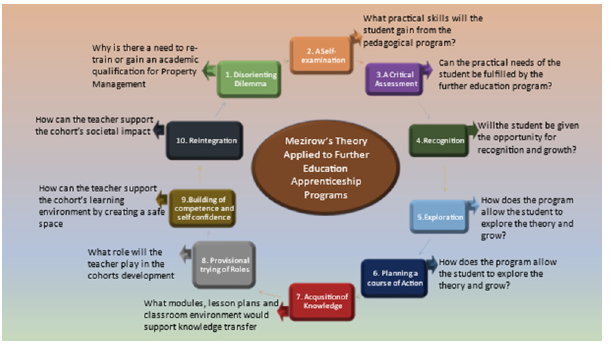
The model highlights the presence of a contextually adapted philosophy in the Irish FE sector [7]. This provides guidelines for decision making and policy setting in the Irish FE sector (CDETB 2023). Such a conceptual framework for teaching methodologies must have practical benefits for the modern society [7]. The main aim of adult education is to affect societal change beginning with local communities [8]. This can happen when varied philosophical perspectives are adapted and implemented [5]. This concept of learning by doing (Dewey 1936), directly influences the current approach to education in the community [9].
Philosophical Theories Relevant to Adult, Community and FE Learning Contexts
“Education is for improving the lives of others and for leaving your community and world better than you found it.” (Edelman 1900s)
The importance of the community in education is a key consideration as it leads to intensive social interaction (Soekanto, 2004). The concept is aimed at building the power of social awareness [10]. Philosophically, education and community should complement each other by providing opportunities for adult learners [11]. Nevertheless, there will always be challenges like the availability of educational services to benefit the entire community (Soekanto, 2004). This is a form of alienation in the midst of a society that is trying to find solution to these educational issues [12]. Education is not limited to the power of theory rather the implementation of infrastructures that provide for community development [13]. Learning does not take place in isolation. It is contextualised and adapted to the needs of each adult community [7]. Figure 2 demonstrates the educators role based on adaptation of their community-led philosophies.
Figure 2.Educators role based on adaptation of their community-led philosophies (Bandura 1978).
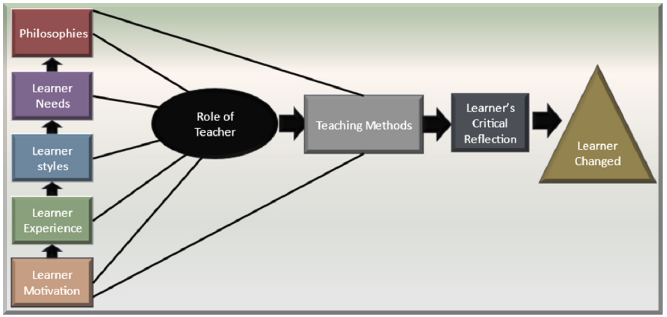
Awareness of the social role that is carried out by each individual in a pedagogical framework is a key factor in this approach, this illustration combines the needs of the learners, the role of the teacher and the philosophical context that leads to the transformative change [14-19]. Freire notes that “Education... is the practice of freedom of means by which men and women deal critically and creatively with reality and find ways to engage in the process of transformation in their own world” [12]. This philosophy suggests that education is not a rigid process, learning activities can be adapted to meet each community’s needs [14]. Freire [12], and Illich [15] suggest that education cannot be built using rigid buildings, rigid approaches, closed theories and frozen educational channels. The main aim is to facilitate communities and their surrounding environment (Knowless 1997). Societal development needs theoretical approaches to education that empowers, and humanises each individual learner [12].
Separately, many humanities academics have examined the cultural links between community and education [14]. Nonetheless literature covering the new approach to apprenticeship programs for adult learners in FE is sparse. This gap in the literature is paralleled by the fact that the number of learners in FE is in decline (CDETB 2023). The following section will examine the practical implementation of a pedagogical framework that will become of practical benefit who wish to combine work based-training with FE learning outcomes.
A Proposed Framework Adult Learning in an FE Apprenticeship Program
“An investment in Knowledge Always Pays the Best Interest” (Ben Franklin)
This section of the paper presents a pedagogical framework based on a review of teaching philosophies and this author’s experiences both as a student and tutor in FE. An understanding of the philosophy of pedagogy is key for any teacher when designing a framework for a specific type of learner. Transformative change theory is the single most important influence on this author’s approach to teaching in particular, Bandura’s Theory (1978). Common elements of the philosophical analysis indicated a focus on the connections between community, the adult learner and transformational change. Therefore, the proposed framework is based on innovative adaptations of previous pedagogical models such as Dale’s Cone of learning and Mezirow’s transformative change model.
Mezirow [8] and Bandura (1978) made a significant contribution to our understanding of the pedagogical environment that must be present when fostering transformative change. The proposed framework will focus on the measuring and monitoring of the learner’s experience during the implementation of a hybrid classroom program. The empirical findings that demonstrate the transformative change have been obtained from this author’s students over the past two years. The apprenticeship program in auctioneering is unique as it allows the adult learner to attend college one day a week and work for four. This requires a condensed approach to achieving learning outcomes. The proposed framework will adapt technologies and traditional methodologies to achieve transformative change. This is reflected in Figure 3 where the Mezirow [8] and Bandura (1978) approaches are augmented based on the pedagogical approach of Dale’s Cone of learning.
Figure 3.The Authors Proposed Framework for the FE Apprenticeship Program.
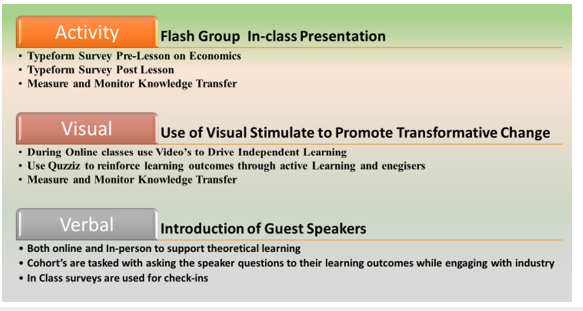
This model presents a more robust framework that combines the philosophies of engagement present in the Mesilow and Bandura models with the diagnosis elements of Dale’s Cone of learning. Additionally, the model’s modification capabilities incorporates both technological and traditional methodologies to evaluate the knowledge transfer. These activities the launch-pad to achieve transformative change. As a large part of a pedagogical planning initiative in this case there are three significant actions that provide modifying intermediary. This provides insight into using active learning strategies when utilising the potential of technologyenabled lesson plans. Figure 4 demonstrates the implementation of such a lesson plan.
Figure 4.Implementation of Proposed Framework.
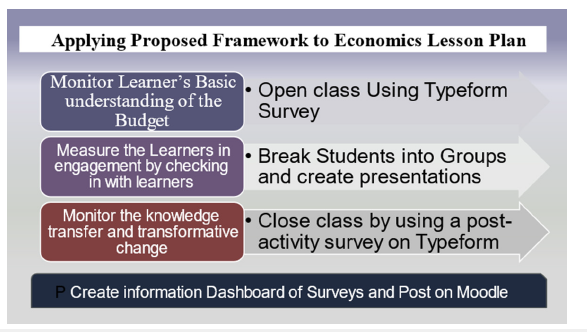
The lesson plan in this instance highlights how the prosed framework can become of practical benefit to teachers in FE. This framework outlines the current role that digital platforms play in contributing to transformative process in adult education. Figure 5 illustrates the post survey dashboard posted on Moodle to reinforce the learning outcomes.
Figure 5.Post-class Dashboard used to Reinforce Knowledge Transfer.
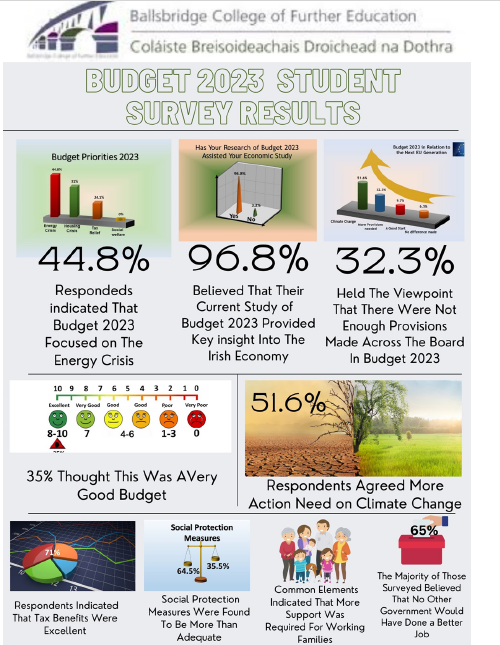
This dashboard highlights the change that occurs when technologies are adapted to augment the use of pedagogical philosophies, supplementing (feeding) the transformative change with the cohort’s input and evaluations of their own learning by creating a forum for social interactions amongst the adult learners. This will allow the adult learner to embrace the knowledge transfer in real time. These workable insights will support the FE teacher in the differentiation of the learning outcomes while measuring and monitoring the progress of the cohorts.
Conclusion
“I believe that education is the fundamental method of social progress and reform.” (John Dewey)
This paper has revealed the importance of a philosophical approach to teaching and the development of a pedagogical framework that can become of practical benefit to those who wish to use it. Mezirow [8] concludes that transformative learning is the key to knowledge transfer for the adult learner. Nonetheless, the findings here reveal that an understanding of how to adapt pedagogical philosophies in the context of communities and the adult learner will allow the teacher to achieve a higher level of knowledge transfer amongst the majority of cohorts. This author concludes that each community of learners have different needs and philosophies can to be adapted to any given educational environment [20-30].
References
- Freire P (1970) Pedagogy of the oppressed. Seabury Press, New York, USA.
- Varaki BS, Sadeqzadeh QA, Sefidkhosh M, Mahdi Sajjadi S, Mohammadi CR, et al. (2020) Philosophy of education in a new key: Cultivating a living philosophy of education to overcome coloniality and violence in African Universities. Educational Philosophy and Theory 54(8):
- Eacott S, Smith S, Peters M, Tesar M (2021) Philosophy of education in a new key: Exploring new ways of teaching and doing ethics in education in the 21st Educational Philosophy and Theory 54(8): 1178-1197.
- Bott PA, Slapar FM, Wang V (2003) History and philosophy of career and technical education. Pearson Custom Publishing, Boston, USA.
- Buchanan RA, Forster DJ, Douglas S, Nakar S, Boon HJ, et al. (1934) Art as experience. Capricorn Books, New York, USA.
- Mezirow J (1991) Transformative dimension of adult learning. Jossey-Bass, San Francisco, USA.
- Dewey J (1916) Democracy and education. Echo Library, London, UK.
- Dewey J (1915) Schools of tomorrow. E P Dutton and Co, New York, USA.
- Dewey J (1910) How we think. Prometheus Books, New York, USA.
- Dewey J (1897) The psychology of effort. The Philosophical 6: 43-56.
- Elias JL, Merriam SB (1995) Philosophical foundations of adult education. Krieger Publishing Company, Florida, USA.
- Freire P (1984) Pendidikan Kaum Tertindas. LP3ES, Jakarta, Indonesia.
- Grow GO (1991) Teaching learners to be self-directed. Adult Education Quarterly 41(3): 125-149.
- Jarvis P (2002) The theory & practice of teaching. Kogan Page, London, UK.
- Philosophy (2004) Role of Adult Educators, and Learning 213. SAGE Publications.
- Illich I (2000) Free Society from the Shackles of School. Yayasan Pustaka, Yogyakarta, Indonesia.
- Obor JP, Jaldemark J, Hurley Z, Bartram B, Matthews A, et al. (1989) The making of an adult educator. Jossey-Bass, San Francisco, California, USA.
- Knowles MS, Holton E III, Swanson A (1998) The adult learner. Gulf, Houston, Texas, USA.
- Mudyahardjo R (2001) Introduction to Education. Rajawali Press, Jakarta, Indonesia.
- Mustikoaji H (2017) Economy, Kompasiana.
- Roy A (2020) The pandemic is a portal. Financial Times, UK.
- Sardo M, Coady CAJ, Bufacchi V, Moghaddam FM, Cassam Q, et al. (2021) Philosophy as a method: Tracing the histories of intersections of ‘philosophy’, ‘methodology’ and ‘education. Qualitative Inquiry 27(5): 544-553.
- Saepudin A (2009) Implementation of lifelong education in family institutions. Jurnal Pendidikan Luar Sekolah 4(2): 859-869.
- Tett L (2010) Community education, learning. Dunedin Academic Press Ltd, Ediburgh, UK.
- Merriam SB, Brockett RG (1997) The profession and practice of adult education: An introduction. Jossey-Bass, California, USA.
- Nuckles CR (2000) Student-centered teaching: Making it work. Adult Learning 11(4): 5-6.
- Waghid Y, Davids N, Mathebula T, Terblanche J, Higgs P, et al. (2020) Reclaiming postmodern Confucianism through narrative and edification. Educational Philosoph and Theory 55(4): 398-405.
- Vezjak ZB, Peters MA, Tesar M (2020) Philosophy of education in a new key: On radicalization and vio lent extremism. Educational Philosophy and Theory 54(8):
- Wang V (2003) Principles of adult education. Pearson Custom Publishing, Boston, USA.
- Skirbekk G, Gilje N (2000) Istoriia filosofí
© 2024 Colm Barcoe. This is an open access article distributed under the terms of the Creative Commons Attribution License , which permits unrestricted use, distribution, and build upon your work non-commercially.
 a Creative Commons Attribution 4.0 International License. Based on a work at www.crimsonpublishers.com.
Best viewed in
a Creative Commons Attribution 4.0 International License. Based on a work at www.crimsonpublishers.com.
Best viewed in 







.jpg)






























 Editorial Board Registrations
Editorial Board Registrations Submit your Article
Submit your Article Refer a Friend
Refer a Friend Advertise With Us
Advertise With Us
.jpg)






.jpg)














.bmp)
.jpg)
.png)
.jpg)










.jpg)






.png)

.png)



.png)






